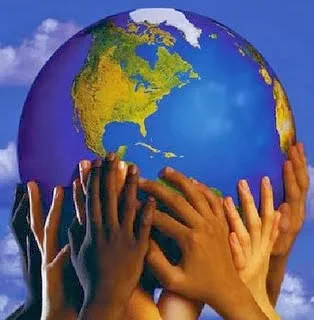The source of most of our frustrations is that we struggle to accept and live with the stone-cold reality of inherent complexity, about which we can (and, I suggest, should) do nothing.
Frequently, too frequently, alas, this frustration boils over and a reactive craving to homogenize lashes out, to eradicate the tensions inherent in diversity, to have the world conform to our tastes and our convenience, to what meets our approval.
"My way or the highway", as they say. And that is the subtext of all dogma.
Usually, this means things/people/ideas that are not like us nor that we understand. Hitler, Stalin, Pol Pot, etc., are the spook-stories people usually tell to make this point.
 |
| Uncle Joe liked his society like he liked his grooming--even and orderly. |
Interestingly, our current best understanding of the metaphysical reality itself seems to suggest that diversity is inherent in the very nature of the cosmos, that the universe is not our poodle, will not be pinned down. If light, say, is BOTH a wave and a particle (two contradictory physical states), if there is matter and anti-matter and 'dark' matter, if solid matter is really energy (etc., etc.) our human impulse to homogenise anything seems delusional, a fool's errand.
 |
| Not 'either/or', but 'both/and'. |
It would seem a radical humility regarding the nature of reality is called for. But how to LIVE in that? This is where Unitarianism comes in. Or at least, where it's supposed to...
(For Unitarian tragics only: all others can skip this next paragraph:)
(A caveat: the root word 'Unity' is a trifle misleading. We're rather odd in being the only denomination whose name bespeaks a theology, and yet we've no set theology. The word "Unitarian" was coined as an opposing response to Trinitarian Christianity, since early Unitarians found the concept of the Trinity neither scriptural (which is the case), nor in accordance with reason (er, how can three be one?). Instead, we suggested that if there was indeed a God, it made more sense (and was truer to scripture) to think of him/her as one and indivisible, hence 'Unitarian'. Interesting footnote in the history of theology though this may be, it is not the point of this post. I just needed to get that out of the way.)
The 'Unity' in Unitarianism can be traced to the 1557 Edict of Torda, an early attempt to guarantee religious freedom in Europe. In essence, it sought freedom of thought, practice, and faith-teaching, for everyone not just those with whom we agreed. A radical humility indeed, based on the fact that no one can know the absolute truth of God (or Ultimate Reality or whatever you will) for absolute certain. Therefore, it called for tolerant respect for the diversity of faith practices and teachings at the time. In that respect, times have changed but little: a tolerant embracing of diversity is still sold as the Unitarian way.
 |
| You can thank, if you want to, Unitarian Francis David for being WAY ahead of his time in saying: "I'm okay; you're okay." |
And yet, depressingly, the exact converse of these sentiments were exactly what I heard bandied by many of my fellow Unitarians, including some of the eminence gris, at our recent ANZUUA conference in Auckland. A few snippet of the dogmatic, exclusionist assertions put forth in paraphrase:
- There is only the big bang, evolution, and randomness. All else is b*llshit, and we don't want people in our membership who recognise for anything else.
- We are alone in a material universe.
- We don't want 'sheep' from other denominations (ignoring the fact that nearly everyone recent began life in another faith tradition). We want only secular atheists. This is what we are.
- Fundamentalism is wrong; therefore ANY and ALL conventional religion is wrong (especially Islam)
Don't get me wrong, it's not that I disagree (though I do). It's that while I would defend to the death anyone's right to hold these views, I clearly would not be accorded the same respect if the old guard had their way.
It was as if the old guard of ANZUUA decided that veganism was the only morally defensible lifestyle and stated baldly that carnivores need not apply. Talk about cognitive dissonance: I wondered what church I had wandered into.
Look guys: even the eminent evolutionary biologist JB Haldane admitted:
"The Universe is not only queerer than we suppose, but queerer than we can suppose."
So how can a gaggle of superannuated (and let's face it) amateur theologians have the chutzpah to suppose they alone know the true way? I am no longer young myself, and I too understand that feeling there are things that time and experience and some reading should make you sure of. And I understand the urge to homogenize your environment, silence the ball of confusion, and have everything conform to your weary requirements. But that, right there, is what drives the young, the seeking, the truly open minds away from our movement and spells its death in a generation or two.
What all genuine science assumes is a radical humility toward this unknowability, including a understanding that scientific materialism is itself a construct that obscures as much as it reveals. As Unitarians, our principles require a humble embracing of the diversity of life, an acceptance that "there is more in heaven and earth than is dreamt of" in our half-baked philosophies.
And to learn to love it all.
Our church, our world, is a messy unity, but only by lovingly holding the contradictions, the confusion, the opposition in equipoise, can we put the "Unity" back into Unitarianism.
 |
| Looks almost like a chalice. |
So may it be.
